8+ Sample Job Contract
-
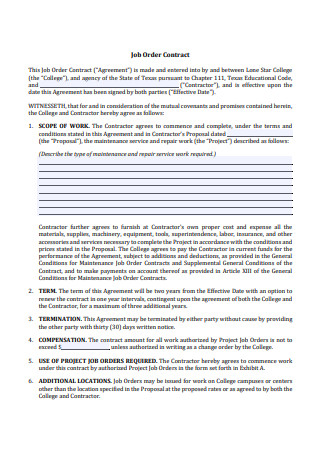
Job Order Contract
download now -
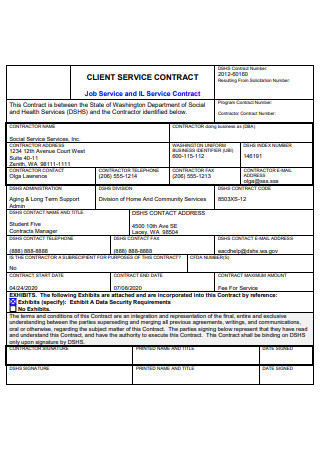
Job Service Contract
download now -
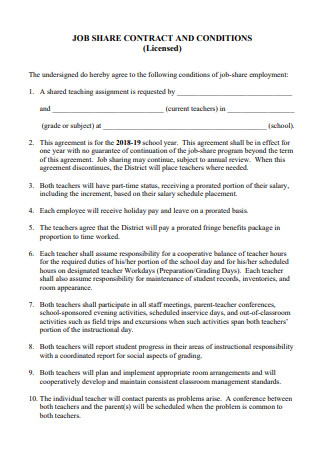
Job Share Contract
download now -
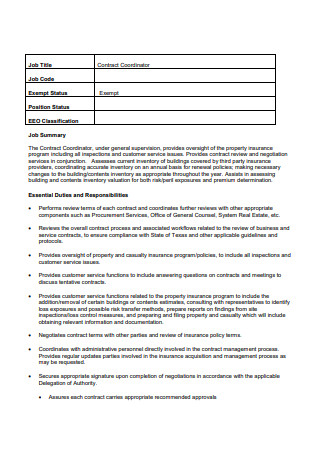
Job Coordinator Contract
download now -
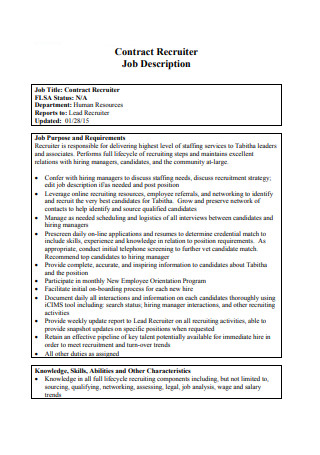
Job Description Recruiter Contract
download now -
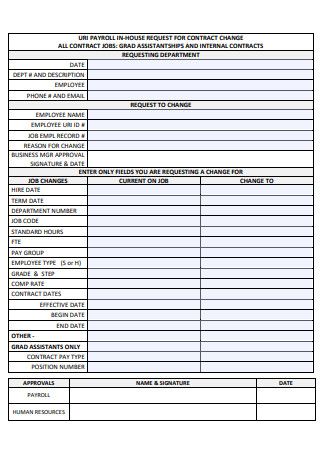
Formal Job Contract
download now -
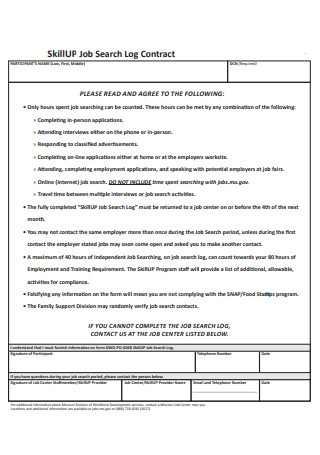
Job Search Log Contract
download now -
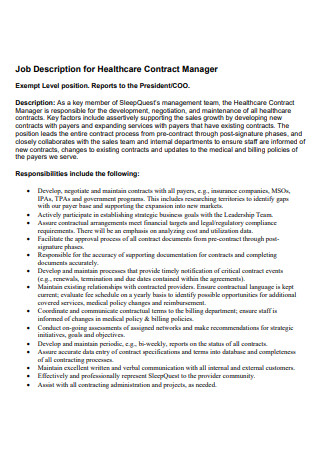
Job Description for Healthcare Contract Manager
download now -
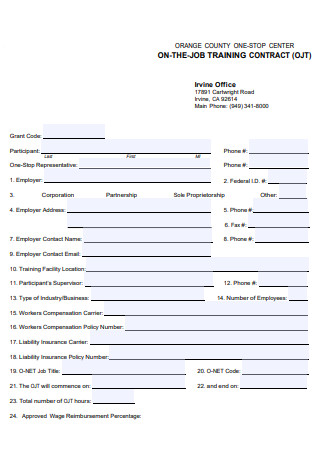
On the Job Training Contract
download now
FREE Job Contract s to Download
8+ Sample Job Contract
What is a Job Contract?
Importance of a Job Contract
Key Elements of a Job Contract
Types of Terminations a Contract Should Allow
How to make a Job Contract?
FAQs
When should an employee sign a job contract?
Can you sue an employer for a breach of contract?
What happens when an employee is done signing a job contract and then declining?
Can employers change the terms and conditions in a contract?
What is a Job Contract?
A contract of employment is a written agreement between an employer and an employee laying forth the terms and conditions of employment. It is an agreement between an employer and an employee on the conditions of work. The agreement can be reached orally or in writing, with explicit and implicit requirements. In every circumstance of employment, employment contracts are not concluded. But it is typically beneficial to have one when the work is not casual. Job contracts can also be done orally. However, it should be written if the parties are serious about the contract. If an employer and employee gets in a conflict, the contract may assist solve the problem. A contract of employment allows the contracting parties to negotiate contractual terms and conditions to protect and clarify the roles between two parties and discuss benefits and compensation. See job contract templates above.
Importance of a Job Contract
There are several uses for contracts and hence many distinct reasons why they are essential. Initially, contracts are the major source of trust for both employer and employee. This creates the establishment of relationships for a firm.
Key Elements of a Job Contract
Here are the important elements an employer or a job contractor should not miss. You can find these elements job contracting examples above.
- Job Title – The contract should include the work title of the employee and shall give a full description of the work of the employee.
- Name of employees and employers – The contract must state the names of the parties involved such as the employee and the employer.
- Duration of the employment – The contract must state when the start date is and when the end date would be, if applicable.
- Place of work – The contract must state the workplace address and the unit or building.
- Rate pay – A contract of employment should describe the sort of compensation which an employer pays to the employee, whether it is salary, wage or commission for the amount of sales, or other monetary value; the contract should specify how much is paid, when, and how, whether twice a week, monthly or any other month;
- Policy regarding sick pay – This contract provision stipulates that employees may be entitled to discretionary sick pay, and that it must be paid in accordance with certain terms and circumstances.
- Hours of work – The contract should specify how many hours a week the employee must work, or whether the job applied is full time, part time etc.
- Holiday entitlement – How much vacation is usually laid out in your work contract. The legislative minimum for banks or public holidays may be 5.6 weeks.
- Termination – The contract may outline the measures to be taken to end the contract. Specify how much notice the employees have before termination.
- Dispute Resolutions – Clauses on the settlement of disputes in a contract are a significant indication of the parties’ intent to collaborate. In general, strong conflict-resolution provisions offer lower cost and quicker ways to dispute settlement and can assist to maintain relationships. They can stop the parties from going to court.
- Confidentiality provision – The contract may include confidentiality clauses to ensure that your business information remains a secret. You can also let an employee sign a stand alone non-disclosure agreement.
- Non-solicitation clauses – A non-request agreement is a standard contract agreement which states that you will not request any company customers, take any workers over, or use any information that is secret with your present employer if you work for the competition. That is to say, you cannot benefit your new firm by using your former company contacts.
- Poaching clause – The previously employed person cannot persuade other workers to leave their present job and to work for him or her without the breaching/recruitment provisions. Again, these restrictions are generally confined to time, location and activity and are more difficult to implement.
- Non-Compete clause – A non-competitive provision in a contract is a legal agreement stating that an employee must not compete with an employer following the end of the time of work or termination. These agreements also prevent the employee from disclosing knowledge or secrets during or after employment with any other party.
- Pension entitlement – All employers are subject to the auto-registering duty and the details of an employee’s pension system and applicable contribution rates should be described in an employee’s contract. Certain employers might want to refer an employee to additional documents.
- Signatures – Signatures are always important in job contracts as this indicates that both parties have read and understood the contract. This makes the contacts legally bound.
Types of Terminations a Contract Should Allow
The contractual termination takes place when the contractual responsibilities of one or both Parties are ended. The quickest method to end an agreement is for both parties to agree that the agreement is no longer required.
1. Resignation of Employee
The employee’s resignation is a unilateral act indicating his decision to terminate the connection with employment. Resignation does not need the employer’s acceptance and cannot be retracted once notified, unless the employer agrees to withdraw.
2. Death of the Employee
Upon death of the employee, the job ends automatically. The Company may terminate employment with the Employee without any delay in the event of disability by receiving written notification of such termination from the Employee. On the other hand, the death of an employer often ends personal contracts immediately. Although the contract expires, the employee has not been allowed to claim compensation for unjust dismissal or statutory redundancy pay on his behalf.
3. Misconduct of Employee
Termination of contract due to misbehavior is a major, well planned disciplinary measure. Before taking any disciplinary action, employers must undertake a formal inquiry. Failure to comply with the terms of employment in the service contract is misconduct.
4. Completion of a project
Your responsibilities as a contractor cease after the project including correcting errors is over and when a defects liability period has elapsed. your obligations under a construction contract. The contract ends alternatively when one of the parties terminates the agreement.
How to make a Job Contract?
It is important to have them professionally evaluated when creating a letter that offers a job combined with the contract to verify that the conditions are clear enough. This will also reduce the possibility that prohibited phrases may be accidentally included.
Step 1: Choose a template.
Choose a job contract from the many templates above, Make sure to choose the template that suits the job title within the contract.
Step 2: Tailor your own job contract.
If there are no satisfactory contracts for you, tailor your own contact by first checking out the formats of the job contract samples above.
Step 3: Choose the best formatting you think is best.
After observing the formatting of the samples, Choose which ones will serve as your guide. Make sure your formatting is understandable and orderly in manner.
Step 4: Start Encoding.
Encode all the necessary information and all the key elements mentioned above. Include everything and the only thing lacking should be the signature as this is done after reading the entire job contract.
Step 5: Ask legal advice.
You can ask legal advice from a lawyer for you to know if the contract you made is effective and can protect both parties in times of dispute. If the lawyer asks for revisions, you should do so.
Step 6: Sign the contract.
Both the employer and employee should sign the contract. Some employers would want the employees to sign every page of the contract just to make sure that they have read and understood every page of the contract.
Step 7: Keep the contract.
Employers should retain a copy of the contract of employment or the current signed terms and conditions of employment. Even if the employer hasn’t signed it, the employer must retain a ‘intentional agreement.’ On request, employees should have the right to have a copy of their agreement.
FAQs
When should an employee sign a job contract?
An employee must immediately do job contract signing when that employee gets accepted to work. This must be signed before an employee starts working because this legal agreement is a document that establishes and defines the rights and responsibilities of both parties namely the employer and the employee or the worker and the company.
Can you sue an employer for a breach of contract?
When an employer or employee breaks or fails to fulfill the requirements of the contract of employment, they may violate the contract of employment. Breaking a job contract might encompass, for instance, serious misbehavior on an employee’s part, anything from very small contraventions such as the failure of the employer to pay costs on the proper date to fundamental violation of a contract.
What happens when an employee is done signing a job contract and then declining?
The employee cannot just back out from a signed contract. The employee has to follow legal actions such as giving the employer a written notice that they’re cancelling the contract that should lead to termination. This basically has to be talked about by both of the parties and the results should be agreed. If not, then this could be helped by the law.
Can employers change the terms and conditions in a contract?
No. Without an employee’s agreement, the employer may not modify the terms of the prior contract. If the personnel are employed collectively, negotiations with the union must take place before modifications are made.
Before signing, employment contracts should be studied as it might have implications if your conclusion of the deal is not maintained. Generally speaking, a contract for employment provides a solid basis for improved employee/employer relations. Both parties have an awareness of each other’s expectations. They are entitled to staff and to the money they may expect to make. If a firm is judged not to have issued a full contract in the case of an employment tribunal, the penalty might be up to a month’s salary.
